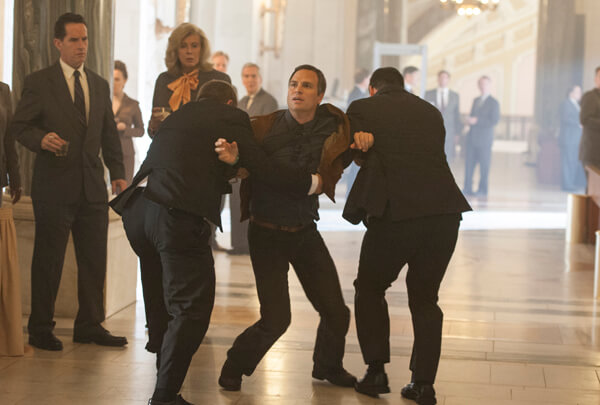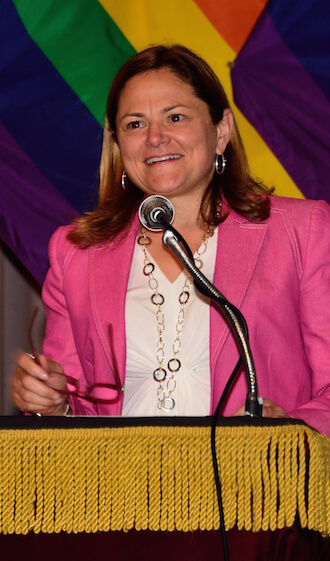ILLUSTRATION BY MICHAEL SHIREY
It’s hard to believe it has been over a decade since HBO broke new ground with “Angels in America,” a revelatory adaptation of Tony Kushner’s Broadway epic about AIDS. The lavish mini-series, boasting a blue-ribbon cast including Al Pacino and Meryl Streep, won a ton of awards and cemented the cable giant’s rep for daring, if not subversive programming.
And now the Emmy-minded network is at it again, this time reinventing “The Normal Heart,” Larry Kramer’s 1985 semi-autobiographical play that was revived on Broadway in 2011 to thunderous acclaim. While both works focus on the AIDS scourge, wrecked lives, and bureaucratic idiocy, the similarity pretty much ends there.
In contrast to the poetic “gay fantasia” that was “Angels,” Kramer’s screenplay is an unblinking, trenchant blend of heart-stopping historical drama and fierce polemic. Directed by Ryan Murphy, mastermind behind shows like “Glee” and “American Horror Story,” the four-hankie “Normal Heart” is as real and raw as it gets.
Mark Ruffalo passionately argues imperative of retelling Larry Kramer’s iconic AIDS story
Murphy has assembled a cast every bit as fine as “Angels.” It’s led by the exquisite Mark Ruffalo (who also co-produced) as Ned Weeks, the alter ego of firebrand Kramer, the driving force behind creating the Gay Men’s Health Crisis when the mysterious “gay cancer” was all but ignored by homophobic officials.
Matt Bomer and Mark Ruffalo in Larry Kramer’s “The Normal Heart.” | JOJO WHILDEN/ HBO
The model-gorgeous Matt Bomer plays Ned’s lover Felix and Alfred Molina is his unhelpful attorney brother. Julia Roberts portrays Dr. Emma Brookner, who fights to treat the first AIDS patients. Joe Mantello, who played Ned on Broadway, is Mickey, a key GMHC member. Jim Parsons reprises his Broadway role as Tommy, a sassy AIDS activist. Sadly, Jonathan Groff has precious screen time as a Pines party boy, one of the first victims to die from the disease. Also on hand are Taylor Kitsch, Denis O’Hare, Stephen Spinella, BD Wong — the list goes on.
Most of these supporting cast members, it should be noted, are openly gay (some married to their partners) and enjoy thriving acting careers, something virtually unthinkable three decades ago.
Fresh off the plane from a film shoot in London, the down-to-earth Ruffalo took time from his frantic schedule to call Gay City News as he was rushing to a press event, with his three kids in tow. The agile, 46-year-old actor, who has tackled everything from the aimless drifter in “You Can Count On Me” to the Hulk in “The Avengers” blockbuster, is something of an activist himself, taking up the anti-fracking cause in upstate New York.
Our chat started out calmly enough, but before long Ruffalo became animated, if not downright fervent. Clearly Larry Kramer has seeped into his soul.
DAVID KENNERLEY: The film was so incredibly moving I was trembling. And your performance was the perfect mix of rage and sensitivity.
MARK RUFFALO: Thanks, I appreciate that, because I think it’s a good reflection of who Larry is. It’s important for people to see not only the anger but also the caring.
DK: What drew you to the role?
MR: It’s such an important time that few know much about, and I was honored to be part of that. It’s just such a great role. I’ve always loved the play and was excited to work with Ryan and expand it using the medium of film. I found myself afraid of the role and that usually means it’s worth doing.
Mark Ruffalo as Ned Weeks raising money to battle “gay cancer” on Fire Island. | JOJO WHILDEN/ HBO
DK: What were you afraid of?
MR: First off, I’m not used to handling that much language. Coming from a play, it’s very stylized, which is very different from most films. [Ned Weeks] is probably one of the most beloved characters in modern theatrical history and in modern gay history. And I’m straight. He has a deep center and I was worried that I wouldn’t get there, that I’d let a lot of people down.
DK: How would you characterize Ned Weeks?
MR: He is an incredibly intelligent, caring, righteous man with an incredible sense of self worth, unusual in a gay culture filled with shame. He was ahead of his time because he identified with other things besides his sexuality. He sees this outrageous injustice, becomes obsessed, and is not afraid of a battle. Ultimately, he’s looking for a connection to people in a profound way.
DK: I recently heard someone suggest that a 30-year-old story about a bunch of hysterical gay men in New York City might be irrelevant. What would you say to that?
MR: [Laughs incredulously.] That person has some ideological bent that keeps them from being wholly human. They are missing the point. Think of movies like “Full Metal Jacket” and “Born on the Fourth of July.” It takes a couple of decades for a culture to be reflective about a specific time in its history. [The AIDS crisis] is probably one of the most tragic chapters of the 20th century, completely swept under the rug. The nation went into post-traumatic shock after witnessing it. We lost a better part of a generation, and we saw incredible cruelty, bigotry, and hatred — everything our nation prides itself on being against. And we haven’t gone back and talked about it. Millions of people throughout the world still become infected each year and millions are still dying.
DK: So the film is as much about today as yesterday?
MR: Absolutely. That group had a hand in all modern activism. They took the civil rights movement and refined it. Without the tragedy of AIDS galvanizing a community, I don’t think gay marriage would be as widely accepted today. Until that point, gay men were relatively fine living in the shadows, having sex with who they wanted. What Larry said was, “No, we have to be proud of who we are and show the world we are no different than anyone else.” That message led to acceptance of gays on many levels.
DK: Did you see the Broadway production?
MR: I wish I had, although I probably would have stolen copiously from my dear friend and mentor Joe Mantello. I was part of a generation that worked on that play every semester in acting school. It was the go-to drama. It had all the juicy parts — powerful monologues and sexy, tough scenes. I was immersed in it and loved tearing it apart and looking inside the mechanics of it.
Mark Ruffalo in Larry Kramer’s “The Normal Heart.” | JOJO WHILDEN/ HBO
DK: Larry did an impressive job adapting the screenplay.
MR: Larry largely reimagined that story — he personalized and deepened it. The aim of the play was agitprop to motivate people. For the movie, he took it out of the polemic and made it more humanizing. Larry cracked himself open in ways he did not even do with the play. We see a more vulnerable version of him.
DK: Did Larry visit the set?
MR: Yes, though sometimes it was obviously difficult. Who I saw was a sensitive, loving, deeply committed guy, and I got to hear the stories from his point of view. He is a survivor, still embattled but more reflective. One of the first things he said was, “Have you read ‘Faggots?’ You can’t play this part until you read that.”
DK: So did you read it?
MR: Oh yeah. I went out and got it immediately. “Faggots” is one of the greatest unsung pieces of modern American literature. It became my primer to gay life before the crisis.
DK: It was gutsy for Ned Weeks to serve neglected AIDS patients meals without protective garb and to continue to be intimate with Felix, whose body was riddled with Karposi sarcoma lesions.
MR: Yes, that shows how pure his love is. Sometimes we don’t know what we are made of until we are faced with something so profound. The gift that those guys had — and their grace — was the ability to love when the world was saying no to them.
DK: There was a wonderful chemistry between you and Matt Bomer. Did Ryan conduct any bonding exercises?
MR: He didn’t need to. When I first met Matt he was very approachable — a kind, sweet man, and I thought this will be easy. Not to mention he’s one of the handsomest men in the entertainment industry.
DK: Is it true that production was suspended to allow Matt to lose 40 pounds?
MR: Yes, we shut down for three months and he went off to lose weight. Then we came back and finished it. It was wild — I’ve never done that before.
DK: What was it like filming the sex scenes, especially when so much was at stake for the characters?
MR: The whole thing had this charge on it — a beauty and rawness. There were the ghosts of hundreds and thousands of people who lost their lives to AIDS. I don’t think a day went by without someone breaking down emotionally. The reality of that time kind of hits you like a frickin’ sledgehammer. When we filmed the wedding scene in the hospital when Felix is dying, everyone started sobbing. We just couldn’t stop.
DK: I have to confess, I found the film relentlessly heartbreaking. Were you ever concerned there is little levity to offer relief?
MR: There’s also affection, camaraderie, and joy. The whole movie is more of a meditation on love and dedication rather than on travesty or injustice. These heroes triumphed. I find that incredibly uplifting.
DK: I love the opening scene when you get off the Fire Island Pines ferry and open your shirt, take one look at the hot guys, and then self-consciously button it up again.
MR: It’s so good, right? That was Ryan’s idea.
DK: I’m sure thousands of men have gotten off that ferry and done that same thing.
MR: I can see why. It was my first visit to the Pines. Just being there was like, “Oh my God! Man, the straight world has got a lot of work to do.”
DK: We’ve been mostly talking about painful stuff. Do you have any lighthearted anecdotes about filming?
MR: As heavy as it was, it was a blast to shoot. Julia and I did a lot of ribbing with each other. Before we shot the scene where she has to touch my feet, she asked me if I was going to get a pedicure.
This interview has been condensed and edited for clarity.
THE NORMAL HEART | HBO Films | Directed by Ryan Murphy | Debuts May 25 at 9 p.m. | For other dates, visit HBO.com | 2 hrs., 15 min.






































